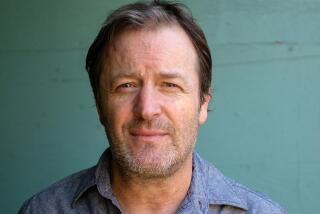MOVIE REVIEW : TURKISH ‘HORSE’ MAGNIFICENT WORK OF ART
- Share via
At the beginning of Ali Ozgenturk’s “The Horse” (at the Nuart for one week only) a group of Anatolian peasants are performing a folk comedy. “Allah created man from earth and water, and fire gave life to man,” the actors proclaim. “Man mounted the horse and plowed the land. The horse and the earth henceforth belong to man.”
That last sentence, of course, applies only to Turkey’s rich landowners and cruelly mocks the very people uttering it. Yet one of their number (Genco Erkal) is determined that not only will his beloved young son (Harun Yesilyurt) have a horse of his own but also an education. With money borrowed from their landlord, father and son head for Istanbul to try to earn enough to fulfill their dream.
“The Horse” has been compared to “The Bicycle Thief,” and there’s every reason to hope that it will become regarded as great a film as the De Sica Neo-Realist classic. It’s one of those instances in which passionate social consciousness inspires and informs a work of art instead of resulting in a heavy-handed message. Ozgenturk and his writer, Isil Ozgenturk, care so much about what happens to this father and son and are so sensitive to injustice that it would seem that the sheer intensity of their feelings allow them to proceed intuitively without a false step. Yet the Ozgenturks have also managed to maintain the detachment necessary for tragedy.
By the time father and son reach the end of their grueling odyssey, “The Horse” has embraced a rich symbolism and developed stunning hallucinatory sequences in a manner that seems effortless and natural. For all the hardships its heroes suffer, “The Horse” attains that quality of exaltation to be found in Shakespeare and the Greek classics.
In Istanbul, ancient city of seedy grandeur, Erkal joins his uncle in the ranks of produce peddlers, pushing a cart over the city’s hilly, cobblestoned streets. The work is not only back-breaking but also illegal; at any moment the peddlers are in danger of having their carts confiscated. (These men can’t sell at the open-air market because they can’t afford the payoffs necessary to obtain space there.) At the same time Erkal commences the increasingly dispiriting task of grappling with the government bureaucracy in pursuit of aid for his son’s education. At one point Erkal learns he has to be dead for his son to be eligible for a scholarship; everything in this picture suggests that Turkey today is deliberately geared to oppressing the poor.
Despite such an unflattering view of conditions under Turkey’s current regime, a depiction that reportedly landed Ozgenturk in prison for undetermined charges in the course of filming, “The Horse” is too timeless, too universal to be only social protest. This film is also a joyous, even humorous, celebration of life and love in the face of circumstances that make happiness fleeting at best. It is a film that cheers a flock of birds in flight--and can focus relentlessly on a fat man, the buttons of his shirt bursting, as he eats his way through a large tray of baklava, which has been refused by the peddlers knowing the man is just waiting for them to die so he can sell their bodies for cadavers.
One suspects that the cast is largely nonprofessional, but their performances are truly towering, especially that of the wiry, woebegone Erkal, who is capable of the pathos of a Chaplin. This superb film, with its rich, ironic imagery and plaintive, keening score, ends as it begins with the glimpse of the landowner’s beautiful white horse, a symbol of hope--but also, at least for now, the unattainable.
Ozgenturk was an assistant for the long-imprisoned and finally exiled Yilmaz Guney, best known for that bleakest of masterpieces “Yol,” and considered Turkey’s greatest director. Playing with “The Horse” is Guney’s “The Wall” (both Times-rated Mature), which is set in Turkey but was shot in France in 1982, the first film Guney was able to direct since 1974. It is a beautifully crafted picture, in which a terrible prison becomes the symbol of present-day Turkey and which concentrates on the plight of some teen-age boys held there. As fine as it is, it really offers nothing new and therefore becomes a form of punishment. Tragically, Guney gained his freedom and resumed directing only to die of stomach cancer in September, 1984, at the age of 47.
More to Read
Only good movies
Get the Indie Focus newsletter, Mark Olsen's weekly guide to the world of cinema.
You may occasionally receive promotional content from the Los Angeles Times.








